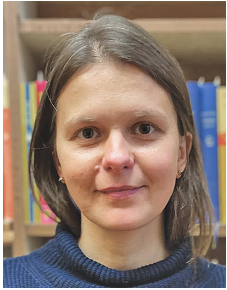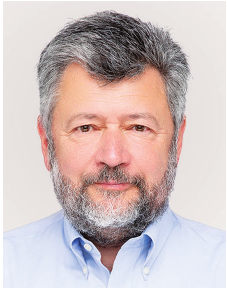PDFLINK |
Voices from the Bombed Universities of Ukraine
The National Universities of Kyiv and Kharkiv have been severely damaged by Russian missiles. We have interviewed several mathematicians working at these two universities. Oksana Bezushchak is the dean of the Faculty of Mathematics and Mechanics at the Taras Shevchenko National University of Kyiv. Sergey Gefter is the head of the Department of Pure Mathematics at the Vasyl Karazin Kharkiv National University. Volodymyr Kadets is a professor in the same Department of Pure Mathematics in Kharkiv, who was wounded during a shelling of the city in March of 2022.
Faculty of Economics and Karazin School of Business, Karazin University.
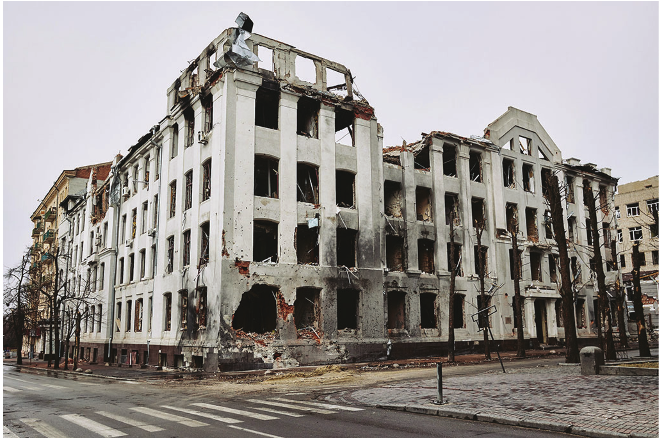
i) Could you please tell us about the destruction of your university. Is there any reconstruction going on? Are students and faculty involved in this process? How long will reconstruction take, in your opinion?
Bezushchak: The buildings of the Kyiv University have been attacked by Russian missiles several times. The most terrible attack so far happened on December 31, where 13 buildings were heavily damaged. Later professors, students, and volunteers removed tons of damaged glass, scrap, and wreckage. We live in hard times for our country and economy, so the rebuilding of our university depends on no one but ourselves. Many students help with the dirty work of cleaning and getting rid of the mess. Our professors used electric and circular saws during their vacations, and covered the damage with plywood shields. Students, alumni, professors, patrons, scientists, and friends are the ones we can count on. Nevertheless, we are proud of our university, because our buildings took the main damage, sheltering and securing the residential buildings which saved many innocent lives. We have already raised donations from the whole university community to prepare and launch the first stage of the repair. We are trying to raise more money to be able to cover as much of the damage as possible, because it is crucial to repair the damage quickly to avoid subsequent destruction and more expense. We are grateful to many foreign partners that have supported our efforts. Right now, we cannot state any certain dates. It is a matter of time.
Gefter: Already in the early morning of February 24, 2022, Russian Federation launched a missile attack on the buildings of the Faculty of Physics and Technology of Kharkiv University, which caused significant destruction. The buildings of the Faculty of Economics, the Institute of Public Administration, the sports complex, the Institute of Banking, and the university clinic were destroyed. Other buildings and structures were significantly damaged, including: the library building, the nature museum, and the dormitories. In the main building of the university, there is a great deal of damage and almost half of the windows have been lost. According to Kharkiv University vice-rector Anatoly Babichev, who is an alumni of the Faculty of Mathematics and Mechanics, the losses to the university infrastructure are preliminarily estimated at more than 100 million dollars. Of course it is impossible to pay this with the University’s budget. In addition, complete reconstruction is impractical because missile strikes on Kharkiv continue. Students, professors, and other employees of the university have worked on bringing the premises to a more or less normal state: they cleaned the glass, repaired what they could as nonprofessionals, blocked the windows, dismantled the rubble, and removed the equipment that was salvageable. The rebuilding process will be long and difficult, but all this will be after the victory.
Mathematicians doing reconstruction work, with Oksana Bezushchak sawing, Kyiv University.
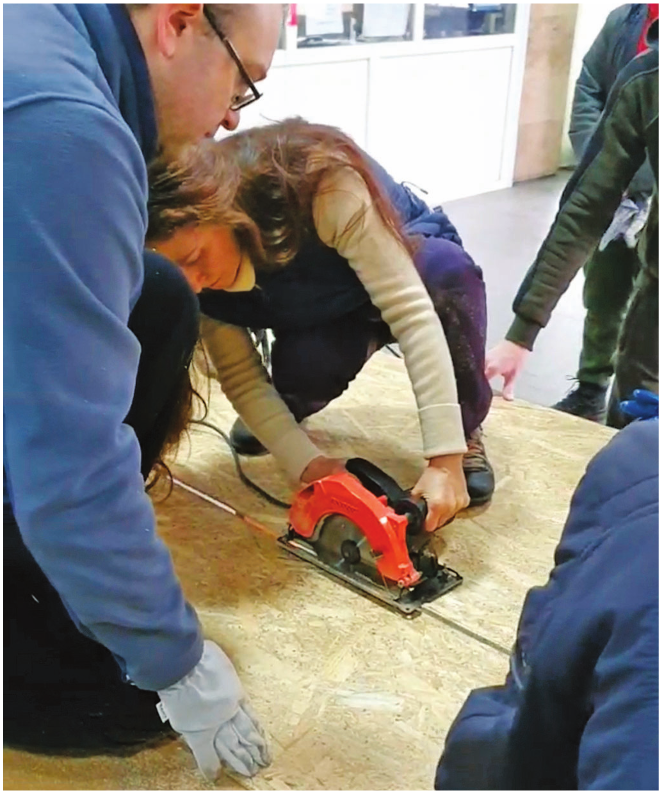
ii) How has the war affected mathematical life in Ukraine? Are you able to teach under bombs?
Kadets: The war has affected the lives of mathematicians in the same ways that it affected the lives of other Ukrainians: by losses, danger, psychological trauma, forced relocations to other cities and even other countries. Mathematicians, and especially “pure” mathematicians, by the very essence of their work are in a privileged position compared to other scientists, because they do not need any equipment for their research. The main thing is the presence of an interesting problem and an inner urge to do research. For me personally, during the war, this inner drive has decreased. I can hardly concentrate and distract myself from current news and everyday problems.
Regarding teaching, on the day of the attack, the administration suspended the work of the university, and we did not work for about a month. It was a very smart decision, because since the beginning of the full scale war, Kharkiv was under heavy shelling. Battles took place on the outskirts, and in the first days, small groups of the enemy even broke into the city itself. I witnessed a combat clash right under the windows of my house. Some university buildings were actually destroyed (the Faculty of Physics and Technology suffered the worst). The central building was damaged, which led to the shutdown of the university servers and, as a result, the university website.
Classes resumed at the end of March. By that time, many teachers and students had evacuated to other, safer places, but in those new places they often had limited access to the internet and difficult living conditions. I missed two classes because I was in the hospital due to an injury. In September we returned to teaching by Zoom, which we had gotten used to during the pandemic. At that time, I was no longer “under bombs”, because my wife and I left for Israel. The students were much worse off, not only because of the immediate danger, but also because of the constant blackouts caused by Russian shelling, problems with heating, etc. I feel uncomfortable teaching in comfortable conditions and safety, when many students have a completely different situation.
Bezushchak: Imagine you are giving a lecture, no matter online or offline. And you hear beating and hitting noises, that are so loud, they cannot be ignored. Is it easy to concentrate and keep working? Now imagine that any of those noises could suddenly terminate your life or the life of someone you love or care. What about your concentration now? And apart from that, after the next hit your electricity disappears for an hour, a day, or a week, who knows. Will you be able to carry out any activity as usual? You decide.
Regardless of the situation, both professors and students keep doing their best to handle it, to teach our future specialists as best we can.
Faculty of Physics and Technology, Karazin University.
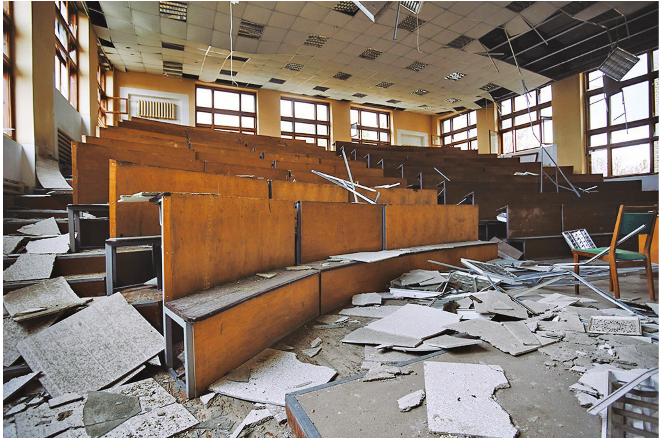
Gefter: The war changed all aspects of life in Ukraine, and, in particular, it affected mathematical life in a fundamental way. During the first months of the invasion, many Ukrainian mathematicians had almost no opportunity to do research, their life was often taken up by their and their family’s physical survival. Some mathematicians ended up in the occupied territories. A significant number of mathematicians from Kharkiv were forced to move to safer places in Ukraine, or even outside its borders. Of course, many scientific conferences were canceled or postponed. Currently, in the unusual conditions of martial law, research continues, and online scientific seminars are held. The Faculty of Mathematics and Informatics continues to actively work with schoolchildren. In January 2023, our Faculty organized the All-Ukrainian Internet Mathematics Olympiad. Regional stages of student olympiads and of the Junior Academy of Sciences in mathematics will be held in the spring.
At the end of March 2022, classes at the Kharkiv University resumed in remote form. Power and internet outages are not an insurmountable obstacle for those who want to work and study. It is not easy to teach and study under rocket shellings, artillery, and mortar fire. Some students who remained in Kharkiv joined online classes from bomb shelters. Sometimes, during air raids, classes had to be stopped and postponed. After heavy rocket attacks, electricity and the internet were often cut off for a long time. In this case, classes and consultations were postponed. Thus, the educational process actually does not stop.
Karazin University.
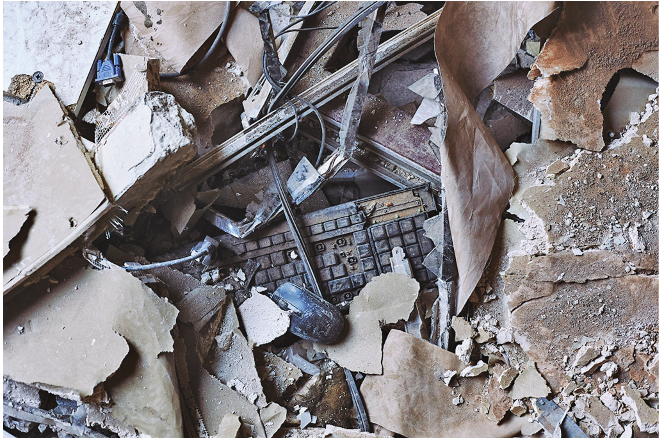
iii) Is there anything the mathematical community could do to help?
Kadets: From the first days of the full-scale war, I personally felt the support of the mathematical community. I received letters from my colleagues from many countries (Bulgaria, China, Czechia, Germany, Great Britain, Hungary, India, Israel, Italy, Poland, Spain, the USA, I apologize if I did not remember someone) with words of support, as well as with touching offers of shelter, temporary work, etc. This moral support was important and I am grateful to everyone for it. By the way, none of my colleagues working in Russia even asked “how are you”… Then there began to appear numerous initiatives providing grants to Ukrainian scientists who had gone abroad, and opportunities for students to study at foreign universities. What we lack is support for mathematicians and university teachers who remain in Ukraine. It would be good if not only famous mathematicians could count on such support, but also ordinary teachers, because many of them are now in a difficult situation, and without them the collapse of the education system is inevitable.
Bezushchak: Not only could help. The help has already started! We express our deep gratitude to mathematicians from many countries who work hard to help Ukrainian refugees. The International Mathematical Union moved the ICM-2022 out of St. Petersburg in protest against the war. This year four well-known mathematicians—Pavel Etingof (MIT), Roman Vershynin (University of Texas), Maryna Viazovska (EPFL), and Efim Zelmanov (University of California)—volunteered to do what they do best: teach the young generation of Ukrainian mathematicians. Maybe for the first time ever our freshmen were taught simultaneously by two Fields medalists. Exams and discussions were handled by our faculty.
We had a bright and extremely talented young mathematician, Yulia Zdanovska. She taught math to talented teenagers. One of the projects she played a huge role in was called “Teach for Ukraine”. Unfortunately, you can never entirely appreciate one’s impact until you lose it. Yulia Zdanovska was brutally killed by Russians in her home city, Kharkiv. Now the address of our Department is: Yulia Zdanovska street.
When Pavel Etingof learned about our Yulia and her project, he initiated an MIT-sponsored project for talented high school students in Ukraine. Some time ago he was a talented high school student in Ukraine himself.
Gefter: These days the mathematicians at the university, as well as the entire university community, need support. Under our conditions of long-term power outages, additional equipment is needed to conduct classes. We have an urgent need for 15–20 laptops and corresponding power banks for teachers and students. We also would be grateful if we could get a license package for one of the latest versions of Maple (online and desktop versions).
Karazin University.
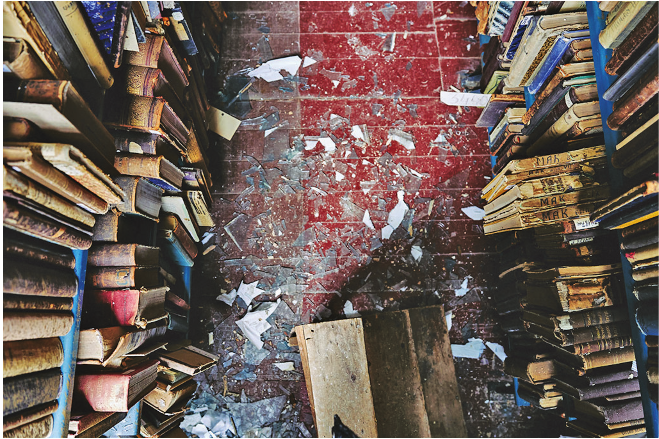
iv) There is an opinion that science should not be mixed with politics and that mathematical activities should go on as usual. What do you think about it?
Kadets: The word “politics” somehow bothers me in this context. Politics is about differences of opinion. Shelling of residential areas, killing, robbing, and abusing people are crimes. The attitude towards this is also not a political choice, but a choice between complicity in crime and taming criminals.
As for the essence of the question, what “as usual” are we talking about? Is it possible to imagine, for example, organizing an international scientific conference in Russia now? Any event of this kind would be de facto support of the Russian government. Funding of the leading Russian journals comes from the government. How could we publish there in these circumstances?
Bezushchak: There is a common belief that science as well as sports, art, etc. should be separated from politics. That is to say that these activities should unite nations, and be the main driver to spread love and unity. But our mathematicians take up arms to defend our country. Our young students die as a result of missile launches. And those that sit in shelters are afraid of being buried alive. When things go in such a way, no normal human being can stand aside pretending that nothing is happening. Regardless of your personal opinion about the war, Russia keeps killing us. The rest is a matter of one’s personal conscience. To sum up, we keep carrying on our mission to bring up the next generation of Ukrainians to form a prosperous European future of Ukraine.
Gefter: I agree with this opinion, but one can hardly call the war in Ukraine politics. Therefore, unfortunately, mathematical activities in Ukraine will not be able to go as usual for a long time.
Anton Ryzhov, at the border of Donbas.
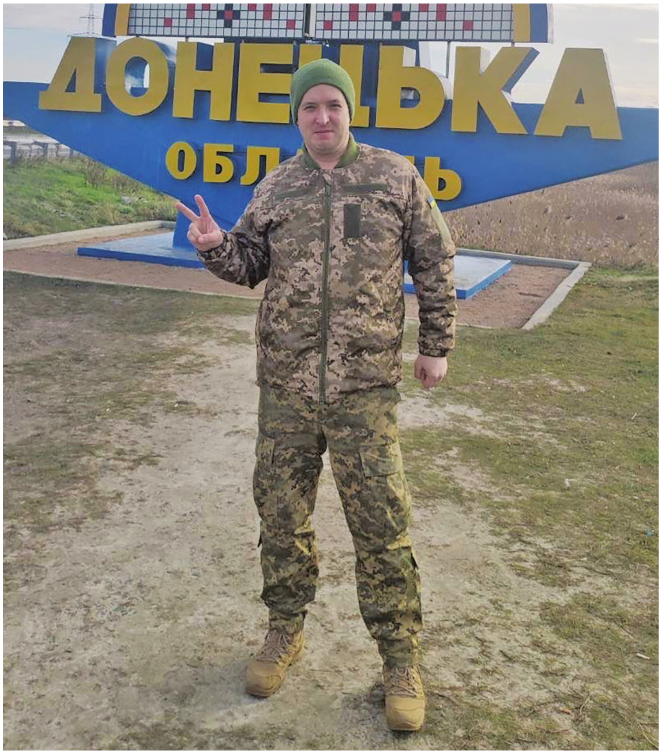
The last question is addressed to scientists who defend their country on the battle field. We received answers from two professors of mathematics at the Kyiv University. Oleksiy Kapustyan is the winner of the award of the President of Ukraine for young researchers and the award of the National Academy of Sciences of Ukraine. His research interests are in the fields of dynamical systems and differential equations. Oleksiy joined the Armed Forces of Ukraine on March 3, 2022. In April–May 2022, he participated in fighting near Popasna in the Luhansk region. In August 2022, after being in the hospital, Oleksiy was discharged due to health conditions. In September he resumed his work at the university. In December 2022 Oleksiy was elected as a head of the Department of Integral and Differential Equations. Anton Ryzhov’s fields of research are biostatistics, data analysis, cancer epidemiology, and optimal control. As of February 25, 2022, Anton is an officer of the Territorial Defence Forces, the military reserve component of the Armed Forces of Ukraine. He served in Kyiv until November 2022. As of December 2022 Anton fights near Bakhmut in Donetsk region.
v) You are a mathematician. What made you take arms and risk your life?
Kapustyan: A professional mathematician, a classical university career—and suddenly a commander of a rifle platoon. What made me to take this step? It is difficult to name one reason. On that day, February 24, 2022, I was confused just as everyone else was. Something had happened that simply could not happen—the war. Probably, the habit of analyzing prevailed over my emotions and helped to highlight the important idea, or strategy: if you don’t know what to do, do what you have to do. And then everything became simple. I realized that protecting my family, my beloved ones, defending my home with weapons, would be the right thing to do, the only solution under these initial conditions.
Ryzhov: Yes, I am a mathematician. But also, I am a father, a son, and a Ukrainian citizen. When a powerful and enormously cruel enemy is going to destroy everything you love, there’s not much time to decide. Being at the front almost from the first day of the war, I make use of my mathematical training as much as possible. I am grateful for all the support my colleagues from the university have provided to me and my unit, we believe that only united we will win. But I also see all the equipment and machinery and other supplies our friends from the West are sending to Ukraine to help us win this war. Then, I can get back to my room and continue all my suspended projects and start teaching new classes, which I am missing the most.
Credits
Figures 1, 3, 4, and 5 are courtesy of Karazin University/Viktoriia Yakymenko.
Figure 2 is courtesy of Kyiv University/Oksana Bezushchak.
Figure 6 is courtesy of Anton Ryzhov.
Photo of Masha Vlasenko is courtesy of Piotr Achinger.
Photo of Efim Zelmanov is courtesy of Efim Zelmanov.


